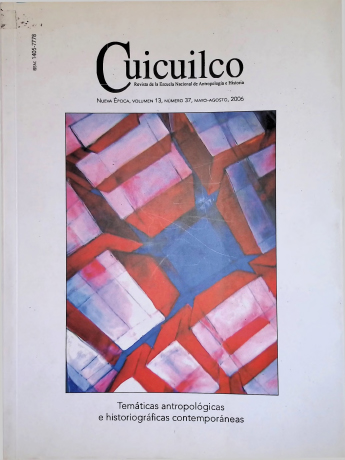Published 2024-01-30
Keywords
- Migration,
- Libaneses,
- Identity,
- Mexico,
- elites
Copyright (c) 2006 Instituto Nacional de Antropología e Historia

This work is licensed under a Creative Commons Attribution-NonCommercial 4.0 International License.
How to Cite
Abstract
Whenever we wish to reinforce a thing we natnralized it. In the case ofthe Lebaneses in México, it is its aureole of power, fame and money what the society naturalizes. The perception on the part of the Mexican society with respect to the social elitism ofthe Lebaneses, shows a set ofgeneric characteristics, where the average terms do not appear (the poor or marginalized Lebanese). The Lebanese was,from his arrival to México, an active agent ofthe construction ofhis identity. And although the familiar trapes about the Lebaneses historically are constituted, such metadiscourses transgress through the emergent performative moments of daily life. The Lebanese, like any other subject, handles his identity based on relational contexts. From the anonymity to the identity exhibition everything is possible.
Downloads
References
- Appadurai, Arjun. 2001 La modernidad desbordada. Dimensiones culturales de la globalización, Buenos Aires, Trilce/FCE.
- Bourdieu, Pierre. 1997 Razones prácticas, Barcelona, Anagrama.
- Brodkin, Karen. 1998 How Jews Become White Folks and What That Says About Race in America, New Brunswick, Rutgers University Press.
- Clifford, Jamec. 1995 Dilemas de la cultura. Antropología, literatura y arte en la perspectiva posmoderna, Barcelona, Gedisa.
- Delgado, Manuel. 1992 La magia. La realidad encantada, Barcelona, Montesinos. 1997 "Qui pot ser 'immigrant' a la ciutat?", en Ciutat i inmmigració, Barcelona, Centre de Cultura Contemporánea de Barcelona, pp. 5-15.
- Fabietti, Ugo. 1997 L'Identita étnica. Storia e critica di un concetto equivoco, Roma, La Nuova Italia Scientífica.
- Goddard, Victoria Ana. 1993 "Antropología mediterránea e identidad europea", en Antropología. Revista de Pensamiento y Estudios Etnográficos, núms. 4-5, Madrid, pp. 5-26.
- Hannerz, Ulf. 1998 Conexiones transnacionales. Cultura, gente, lugares, Madrid, Cátedra.
- Herzfeld, Michael. 2001 Anthropology. Theoretical Practice in Culture and Society, Oxford, Blackwell.
- Kilani, Mondher. 2000 "L'inhumanité de l'autre? Notes sur quelques concepts clés", en Gallissot, René, Mondher Kilani y Annamaria Rivera, L’imbroglio ethnique, Paris, En quatorze mots clés, Payot Laussane, pp. 9-31.
- Martínez, José. 2002 Carlos Slim, retrato inédito, México, Océano.
- Martínez-Montávez, Pedro. 1994 "L'Islam a América", en De Epalza, Mikel (dir.), Equip cidu?b. L’Islam d'avui, de dernd i de sempre, Barcelona, Centre d'Estudis de Temes Contemporanis/Enciclopedia Catalana, pp. 339-359.
- Martínez Montiel, Luz María y Araceli Reynoso Medina. 1993 "Inmigración europea y asiática, siglos XIX y XX", en Bonfil Batalla, Guillermo (comp.), Simbiosis de culturas. Los inmigrantes y su cultura en México, México, FCE/CONACULTA, pp. 245-424.
- Miller, Daniel. 1998 A Theory of Shopping, Cambridge, Polity Press/Cornell University Press.
- Páez Oropeza, Carmen Mercedes. 1984 Los libaneses en México. Asimilación de un grupo étnico, México, INAH.
- Pareto, Vilfredo. 1965 Oeuvres completes, Génova, Droz.
- Ramírez, Luis Alfonso. 1994 Secretos de familia. Libaneses y élites empresariales en Yucatán, México, CONACULTA.
- Rao, Apama. 1987 "The Concept of Peripatetics: An Introduction", en Rao, Aparna (ed.), The Other Nomads: Peripatetic Minorities in Cross-Cultural Perspective, Bóhlau Verlag, Kóln, pp. 1-32.
- Rodinson, Máxime. 1993 L'Islam. Politique et croyance, París, Fayard.
- Roosens, Eugene. 1989 Creating Ethnicity. The Process of Ethnogenesis, Sage, Newbury Park.
- Shore, Cris y Stephen Nugent. 2002 Elite Cultures. Anthropological Perspectivas, Londres, Routledge.
- Smith, Anthony D. 1986 The Ethnic Origins ofNations, Oxford, Blackwell.
- Thomas, William y Florian Znaniecki. 1984 The Polish Peasant in Europe and America, Chicago, University of Chicago Press/Urbana.

